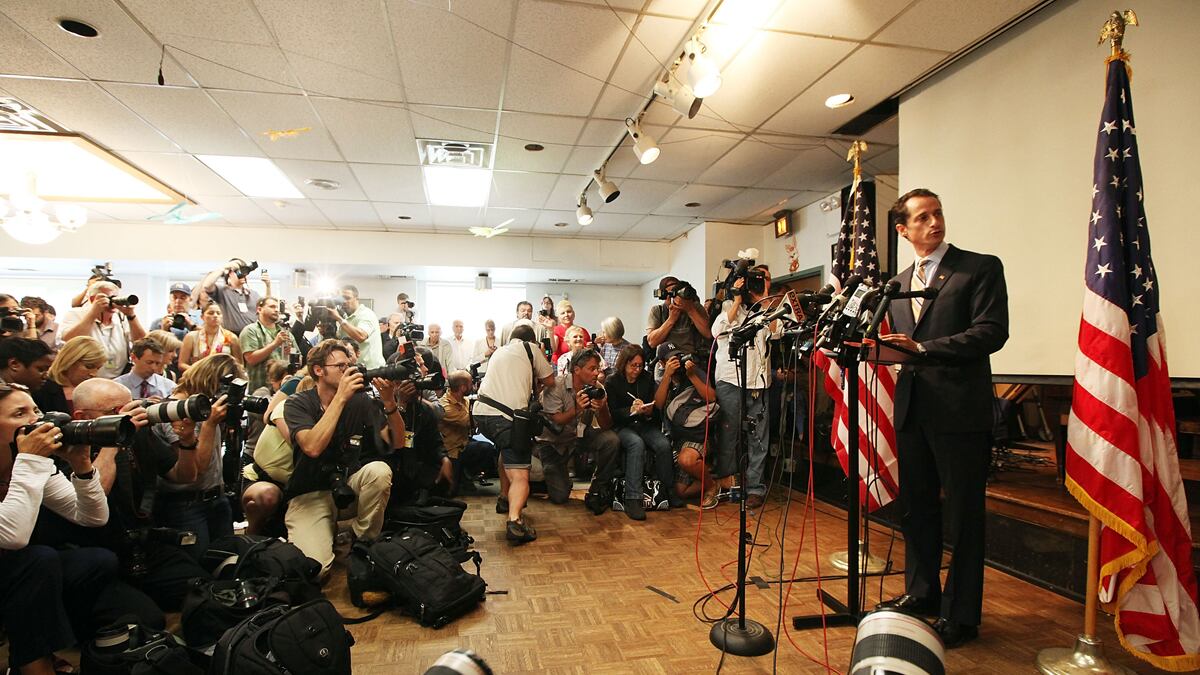The gleeful, vindictive celebratory dance over the downfall of Anthony Weiner made me recall a sobering anecdote from another time.
Watching a performance of Brecht and Weill’s Threepenny Opera in 1932, three months before Hitler came to power, the famous German-Jewish scholar Gershom Scholem had a startled reaction: “I was astonished when I saw that a middle-class audience that had lost all sense of its own situation was here cheering a play in which it was gibed and spat at with a vengeance.” Scholem darkly concluded that “this was a true prelude of what was to come.”
I don’t think that Weiner’s punishment for sending women photos of himself—among other pictures—standing in the congressional gym clad in only a towel and holding his crotch means that a homegrown Hitler is waiting in the wings. On some level, Weiner got what he deserved. But I do think that we have lost all sense of our situation when we don’t realize that the gibing and spitting at Weiner is also, in part, a gibing and spitting at the nature of our democracy. At ourselves.
Beholding the undignified spectacle of Weiner’s online antics, we ask ourselves how a high elected official could be so vain, so reckless, so irrational to behave in such a way. What we don’t seem to consider is that the nature of the modern democratic politician is to love himself inordinately, to hold himself above the rules as he seeks to rise above the mass of his fellow citizens, to be so irrational as to think that he can both stick to his principles and please as many people as possible. When we dance and prance over Weiner’s destruction, we are pronouncing a death sentence on precisely the qualities a democratic politician needs to function. We are digging democracy’s grave.

Of course, modern democratic politics hardly requires married middle-aged politicians to go online and send preening pictures of their crotch to porn stars and blackjack dealers. Think: Lincoln, FDR, Truman, Eisenhower, Reagan, et al. There is an honorable dimension to daring rooted in vanity, to reckless boldness, to irrationality in the service of an ideal.
But life has a peculiarly strict mathematical quality to it. Every action has a reaction. Every positive advance exacts a negative tradeoff. The positive super-dynamic qualities of the politician have their not-so-super underside. There is something psychologically warped to begin with in the belief that you are destined to shape history, to be all things to all people, to rise above the crowd of your fellows and lead it in the direction you choose for them. Is it any surprise that the dark side of an already perverse psychic quality is, when it is discovered, often even more perverse?
The irony of the Weiner episode is that Weiner channeled the private, illicit excess of his respectable, public need to be loved and admired onto the Internet, where he thought he could maintain his ethics. Perhaps he had congratulated himself for his self-restraint in avoiding real adultery, real manipulation of women. There is, in the deafening condemnation of Weiner, almost a taunt of wimpiness, as if he wasn’t man enough to go out and use his power and actually bend a woman to his will and bring her to bed. In l’affaire Weiner, we are maybe being more French than we like to admit.
Nixon believed that the only crime he had committed was getting caught. Weiner’s only crime was being seen. “Laws are like sausages,” Bismarck once famously quipped. “It is better not to see them being made.” Until recently, we never had the technology or the culture of transparency that made it possible to see our Weiners being made. But it could well be that if we lifted the veil of history we would see the moral equivalent of Weiner’s crotch shots—i.e. the negative underside of the democratic politician’s quasi-psychotic need to be loved and admired by voters—in more modern democratic politicians than we’d like to think.
Perhaps a Congress in which the majority of members are women rather than men might be less prone to egotistical implosions, but to think so would be to deny women the vitality we grant to men. The fact is that the media, and even our adversarial political parties, are much more restrained when it comes to exposing the embarrassing private lives of female public figures. But we all know examples of women who are every bit as vain, impulsive, and power-mad as men, don’t we?
I think it was Lord Acton who said that every political system sows the seeds of its downfall in the very principles that make it a success. Being such a freak of social and psychological nature to begin with, the modern democratic politician should not frighten us so much when we see him at play. If we desire paragons of sexual probity and purity, we must turn to the products of democracy’s alternatives: the straight and narrow Robespierres, Lenins, Stalins, and Hitlers. They lied, cheated, tortured, and killed—but despite some fairly unconventional fetishes, they kept their pants zipped up and wouldn’t have been caught dead grabbing their crotch in a pathetic bid to be loved. But they didn’t pathetically pursue, to a routinely sociopathic degree, the love of their constituents, either.






